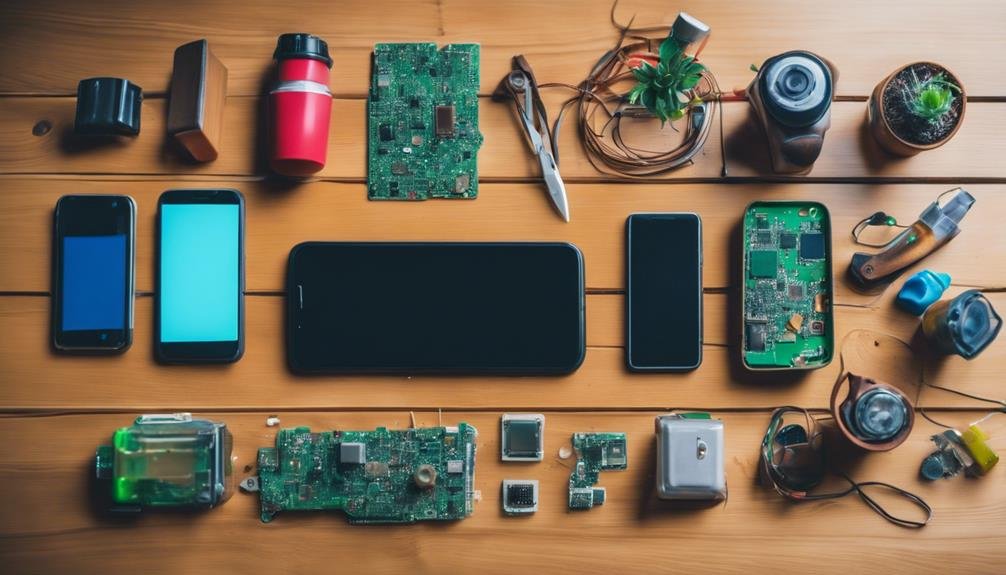Smart ways to recycle old phones include utilizing buy-back programs offered by cellular carriers and manufacturers. Consider donating functional devices to charities that help underserved communities. For non-working phones, look into recycling initiatives that convert them into funds for charitable causes. Always perform a responsible recycle cell phone procedure factory reset to protect your data before donating or recycling. Furthermore, search for local drop-off locations, like ecoATM kiosks or retailer recycling bins, to guarantee proper disposal. You may likewise find opportunities to recycle phone accessories, contributing to e-waste recycling efforts. Engaging in these actions helps reduce electronic waste and promotes sustainable practices as you discover further options.
Importance of Recycling Phones
Recycling phones is crucial for mitigating the significant environmental impact of electronic waste, as discarded devices contain harmful toxins that can contaminate ecosystems and pose health risks to both wildlife and humans.
Each smartphone contains toxic substances found in electronic waste can be harmful if not properly disposed of through recycling programs. such as lead, mercury, and nickel, which can leach into soil and water, causing severe ecological damage.
By recycling these devices, we reduce the volume of e-waste entering landfills, thereby conserving natural resources and minimizing environmental contamination.
Furthermore, recycling allows for the recovery of valuable materials, such as precious metals, which can be reused in new products.
To guarantee effective recycling, individuals must seek proper disposal methods and utilize available resources, thereby promoting sustainable practices and protecting both human health and the environment.
Recycling Options Available
Numerous avenues exist for individuals to responsibly recycle your phone to ensure that its components are reused or disposed of safely. their old phones, ensuring both environmental protection and the recovery of valuable materials through efficient recycle old cell phones initiatives.
Cellular carriers often provide buy-back or trade-in programs, allowing users to exchange their old devices for credit. Furthermore, major manufacturers like Apple and Samsung offer mail-in recycling options for old phones, regardless of their condition.
Local businesses, nonprofits, and schools may likewise have recycling initiatives. Some organizations accept functional phones to support charitable causes, whereas others focus on broken devices.
Finding Drop-Off Locations
Locating convenient drop-off locations for old phones is vital for ensuring responsible disposal and minimizing electronic waste.
Start by checking with local retailers, as many offer recycling kiosks for phones and accessories. In addition, organizations like Call2Recycle accept phones and batteries at various sites; visit their website for specific locations.
Automated kiosks, such as ecoATM, are also available in numerous places across the U.S. Community recycling events provide another option for responsible disposal.
When planning a drop-off, confirm whether the location accepts cell phone batteries, as some programs specialize in battery recycling.
Charitable Recycling Initiatives
Charitable recycling initiatives provide an impactful avenue for individuals to donate their old cell phones to promote cell phone recycling and support local charities. during the support of various social causes. Many organizations accept functional phones, redistributing them to underserved communities, victims of domestic violence, or military personnel.
Programs like the World Computer Exchange facilitate the donation of devices to improve communication access for low-income families. Furthermore, many charities recycle non-functional phones to generate funds for their missions.
It is crucial to research and select reputable organizations that guarantee data security through proper data wiping practices. Before donating, individuals should back up any necessary data and perform a factory reset.
Engaging in these charitable recycling initiatives not only aids others but likewise promotes responsible disposal of electronic waste.
Repurposing Old Devices
Repurposing old devices offers innovative ways to extend their usefulness as well as reducing electronic waste.
Functional smartphones can serve various roles, such as dedicated music players, e-readers, or even digital photo frames. In addition, older devices can be repurposed as home security cameras or smart home remotes, enhancing home automation without incurring new costs, while also promoting cell phone recycling.
For those concerned about privacy, it is crucial to perform a factory reset to erase personal data before repurposing.
Moreover, donating non-functional phones to organizations can support community initiatives, providing resources to underserved populations.
Accessory Recycling Opportunities
As many consumers focus on recycling their old smartphones, accessory recycling opportunities are equally important in reducing electronic waste and promoting sustainable practices.
Accessories such as chargers, headphones, and cases often accumulate alongside discarded devices. Many retailers and manufacturers offer dedicated recycling programs for these items, ensuring proper disposal.
For example, major electronics stores frequently provide drop-off bins, particularly for accessories. Moreover, check with local recycling centers to confirm the acceptance of various accessories.
It is vital to separate these items from general waste can be significantly reduced by properly disposing of electronic waste. to minimize landfill contributions through effective e-waste recycling. By actively participating in accessory recycling, consumers can greatly reduce the environmental impact of their electronic waste as they support a more sustainable future.
Understanding Replacement Trends
Analyzing replacement trends in smartphone usage reveals significant shifts in consumer behavior and preferences, influencing the overall lifecycle of electronic devices.
Remarkably, the average replacement cycle in the United States is extending, with users opting to keep devices longer because of increased durability and performance capabilities. This trend can lead to reduced electronic waste, as longer device lifespans may decrease the frequency of replacements.
Nevertheless, as new features and technologies emerge, some consumers may still feel compelled to upgrade. Understanding these dynamics can guide recycling initiatives, encouraging manufacturers to develop more sustainable practices.
Consumers should be aware of their habits and consider recycling options when they do decide to replace their devices, thereby minimizing their environmental impact.
